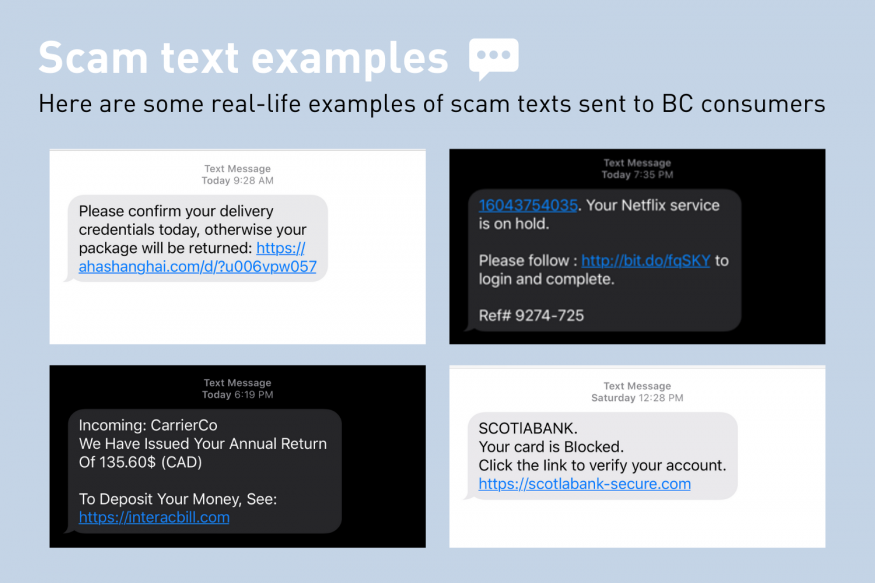Do you get a couple scam texts a week like us? Learn how to spot this incredibly popular scam like a pro by keeping these key tips in mind.
What are scam texts?
Scam texts are a phishing method used to capture your personal or financial information (sometimes referred to as “smishing”).
The scammers will text you and attempt to impersonate a business you’re familiar with. The text may say that it’s coming from a trusted and well-known brand such as Netflix, Amazon, a bank, an internet provider, and so on. The scammers find creative ways to lure you into providing sensitive info, such as your credit card information, usually with the goal of stealing your money or your identity.
While this is not a topic we can help you with under our laws, we are sharing this information for educational purposes and to help spread the word about these common scams. Scams and fraud are typically handled by law enforcement and the Canadian Anti-Fraud Centre.
Examples of scam texts
Scam texts may spark your curiosity by saying you’re owed a refund due or that you missed your package delivery. They may use scare tactics and threaten to close your accounts or arrest you if you don’t comply. Sometimes they will pretend they need to verify your identity or update your payment method.

Red flags that it’s a scam text
It’s safest to assume that texts from unknown numbers are a scam! Here are some ways to spot them:
- They come out of the blue from a number you don’t recognize
- Claims to be a credible organization or familiar brand
- A tone of urgency that asks you to take immediate action
- An attempt to spark your curiosity
- A threat of negative consequences or the promise of a reward
- Includes a suspicious link
- Bad grammar or formatting (but not always)
How to avoid being duped
- Ignore and delete texts from unknown numbers
- Block or report the number
- If you’re really not sure, independently verify through the business they’re claiming to be (i.e. call your bank directly to confirm)
- Never click any links!
- Do not reply
- Never share personal, confidential, or financial information over text
- Follow us on Facebook, to see regular real-life examples of scam-texts (like the ones above)
- Protect your loved ones by spreading the word
Learn more about scam texts and different phishing forms to watch out for by checking out Get Cyber Safe.
Where to go for help
We do not have legal oversight when it comes to scam texts in BC. This information is purely for educational purposes.
If you feel that you may have been a victim of fraud, please contact your local police (non-emergency) as soon as possible and report it to the Canadian Anti Fraud Centre.
Did you like this? You might like these posts too!
Top 6 tips to protect you from scammers
Phishing: don’t get reeled in
Were you a victim of a scam? Watch out for the “recovery pitch”
What to do if you receive a spam text
About Consumer Protection BC
We are not-for-profit regulator responsible for overseeing certain industries and specific consumer transactions in British Columbia. If your concern is captured under the laws we enforce, we will use the tools at our disposal to assist you. If we can’t help you directly, we will try to offer a referral to a relevant organization, if one exists. Other times, court or legal assistance may be the best option. Explore our website at www.consumerprotectionbc.ca



Reporting the cops is a complete waste of time. They will claim that they do not have the resources to track down the scammers.
I know this because someone tried to scam me with a cheque written on a non existant branch of TD Bank. I was selling a sewing machine and the scammer replied to my ad.
God granted me the intelligence to see through it all.
Again I reiterate that the cops did nothing even though I kept this fish on the hook for over two weeks.
They totally are too busy. The Federal Government has cut back federal policing funding so far over the years that they don’t have the specialized plain clothes sections or the training courses necessary to investigate these crimes which take a lot of time and know how. It’s a total shame I know but police resources are thin.
My question is about travel refunds of fully paid for a cruise next April told credit for further trips but no cash refund until Dec 32/2024 yeah 2024
They cancelled the contact I would like a refund
Graham
Hi Graham, thank you for reaching out to us. We have a lot of helpful information on our website about travel refunds and the page expands on eligibility, required steps, and more. Please visit the page and if you have any questions, please contact us. Thank you!
Avoid These Common Text Scams Instead of responding to these fraudulent text messages, inform your service provider of any suspicious activity. As a reminder, report all mobile numbers used and never provide bank information or send money.
Thanks for the extra tips!
Legitimate text messages from a business tend to use natural language, proper punctuation and will likely be free of misspellings and grammatical errors. Unusual language is a sign of a text scam. It can be tricky to identify a text scam by the link itself.
If you were to receive a text from a random number asking for help, you might be inclined to send money to an unverified destination in case it would help a loved one. Family crisis text scams use this psychology to trick recipients into thinking a family member is in danger—and that they need to send money to correct the situation.
I just want to say thank you for this great website. I found a solution here on consumerprotectionbc.ca for my issue.
Legitimate businesses commonly use a URL shortener in their text messages to save on the allotted SMS character count and to track the effectiveness of marketing campaigns. A clue of a legitimate URL is by spotting the name of the URL shortening service in the URL itself, such as bit.ly or tinyurl.
People need to start taking responsibility for themselves and their actions. There’s an anti-fraud website where you can report a scam, but also check the updates on the latest scams going around, and you can get a feedback on the phone number that called you. I have the website in my browser and I also rely on google scam verification: with the push of one button, whoever’s calling gets a message that I’m screening calls and so far, every time, the “person” on the other end hung up.